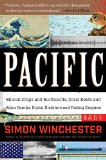Summary | Excerpt | Reviews | Beyond the Book | Readalikes | Genres & Themes | Author Bio
Silicon Chips and Surfboards, Coral Reefs and Atom Bombs, Brutal Dictators, Fading Empires, and the Coming Collision of the World's Superpowers

Critics' Opinion:
Readers' Opinion:
First Published:
Oct 2015, 512 pages
Paperback:
Oct 2016, 512 pages
 Book Reviewed by:
Book Reviewed by:
Kim Kovacs
Buy This Book
Excerpt
Pacific
The Pacific is an oceanic behemoth of eye-watering complexity. A near-limitless range of human and natural conditions exists within its borders, as one would expect of something so unimaginably enormous. Arthur C. Clarke once remarked, with droll prescience, that a space traveler, upon seeing our planet, would say that calling it Earth was a grave misnomer, since most of it is so obviously Sea. He must surely have been thinking of the Pacific, since its blue expanse entirely dominates the planet.
Its dimensions are staggering. It occupies almost one entire hemisphere. Looking westward, from Panama, and from where Balboa stood on his high peak in the Isthmus of Darién, across to the first encountered landmass of the eastern Malaysian coast, there are more than 10,600 miles of uninterrupted sea. From north to south, from the fogs and shivering waters of the Bering Strait down to the ice cliffs of Marie Byrd Land in Antarctica, is nearly nine thousand miles. The sixty-four million square miles in between fill almost one-third of the planet's surface. Forty-five percent of the planet's total surface waters are found in the Pacific Ocean, and seven miles down, it has the earth's deepest trenches. In short: everything about the Pacific, the last ocean to be found by Western man, presents an unchallengeable superlative.
It is also not easy to get into, or out of, and this difficulty insulates it from the rest of the world's oceans. Except for vessels bold enough to try the Bering Strait, between Russia and Alaska, or the gale-whipped seas that fringe the Antarctic, the Pacific enjoys no entranceway that is more than three hundred miles wide. Ships trying to enter from the Indian Ocean must make their way through a litter of islands scattered between Malaysia and Australia, the so-called Maritime Continent. Except for the Strait of Magellan, far down south, there is no natural entrance whatsoever on the American side. Only the Panama Canal, that narrow funnel gouged artificially through the isthmus in the early twentieth century, permits carefully sized ships from the Atlantic the luxury of a quick and easy transit.
The vast distances inherent in the Pacific's geography have consequences seldom known elsewhere. Consider the Republic of Kiribati, for instance, once the British-run Gilbert Islands. Its one hundred thousand inhabitants are spread over fully 1.35 million square miles of ocean. Two thousand miles from Tarawa, its administrative capital, lies Kiritimati Island—the Christmas Island where the British tested their atom bombs back in the 1960s, without evacuating any of the locals. Not only are these five thousand Kiribatians inconveniently distant from their country's capital, but they also are on the other side of the equator from Tarawa, and live on the day-before side of the International Date Line. So a summer Sunday on Tarawa is a winter Saturday on Christmas. Small wonder Kiribati struggles, having to cope with such logistical madness. It is one of the world's poorest countries: the seaweed and copra and fish it harvests are too expensive for most locals, so many of its menfolk are obliged to work abroad or to crew on long-distance cargo ships, remitting their paychecks home, both to keep their families in victuals and in the hope of keeping their country's pitiful economy alive. Size can be impressive, or it can be an impressive nuisance.
The Pacific is an ocean of secrets. Castaways, runaways, fugitives of all kinds people its recent history: the first islands that a sailor heading north from the Strait of Magellan encounters are those volcanic relics of the Juan Fernández group—where the Fifeshire buccaneer Alexander Selkirk was marooned for four years, his adventures later memorialized by Daniel Defoe in Robinson Crusoe.
Much of the dirty business of the modern world has been conducted within the confines of the Pacific. The nuclear testing—by the United States in the Marshall Islands, by Britain on the Gilbert Islands, by France in its remaining Polynesian possessions—is well enough known. In 2008, when a secret American reconnaissance satellite got into trouble in orbit and needed to be shot down, the military ordered a navy ship specializing in missile attacks to bring it down over the Pacific, supposing the ocean to be so vast that it would be harmless there. The Marshall Islanders complained about what they saw as the Pentagon's cavalier attitude, insisting that they lived in the ocean, as did millions of other islanders, and it was not some empty space on which any dangerous test might be performed at will. As it happened, the satellite was brought down locally, and the hydrazine rocket fuel hurt no one.
From Pacific by Simon Winchester Copyright © 2015 by Simon Winchester. Reprinted courtesy of Harper, an imprint of HarperCollins Publishers.





The Flower Sisters
by Michelle Collins Anderson
From the new Fannie Flagg of the Ozarks, a richly-woven story of family, forgiveness, and reinvention.

The House on Biscayne Bay
by Chanel Cleeton
As death stalks a gothic mansion in Miami, the lives of two women intertwine as the past and present collide.

The Funeral Cryer by Wenyan Lu
Debut novelist Wenyan Lu brings us this witty yet profound story about one woman's midlife reawakening in contemporary rural China.
Your guide toexceptional books
BookBrowse seeks out and recommends the best in contemporary fiction and nonfiction—books that not only engage and entertain but also deepen our understanding of ourselves and the world around us.